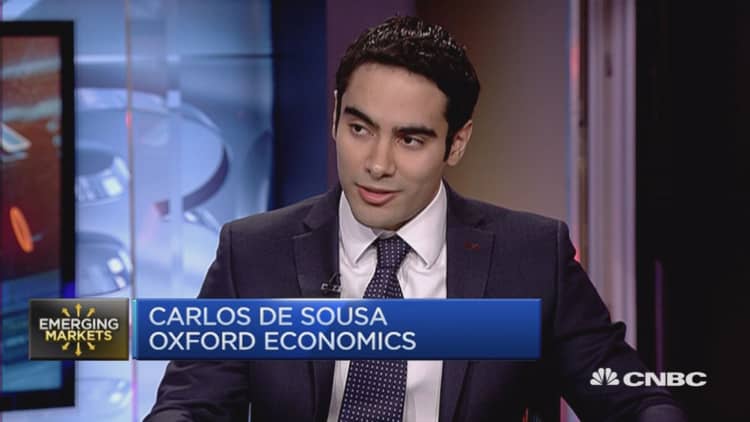
German airline Lufthansa cancelled its flights between Germany and Venezuela over the weekend, in the latest sign of the socialist country's growing isolation and economic, social and political turmoil.
Venezuela's economy is seen shrinking 8 percent this year, with hyperinflation averaging 481.5 percent, according to the International Monetary Fund.
Lufthansa will halt the only remaining flight between Germany and Caracas from next month, the Financial Times newspaper reported on Sunday. The carrier said this reflected the country's declining economy and the difficulty of repatriating money from Venezuela due to currency controls.
Amid shortages of basic goods including food, energy and medications, the overthrow of Venezuelan President Nicolas Maduro is viewed as increasingly likely — and the U.S. fears the consequences, given Venezuela's proximity and oil wealth. Earlier this month, U.S. intelligence officials warned on the possibility of a "palace coup," led by Maduro's associates, or a military uprising, according to media reports.
"Serious and/or widespread social unrest remains the key variable that could alter the outlook and hasten a government collapse," Nicholas Watson, senior vice president at Teneo Intelligence, said in a report on Thursday.
Venezuela is set to hold a "recall" referendum to remove Maduro, in what would be the equivalent of a popular non-confidence vote. The government is expected to try to delay the referendum until after January 10, 2017, which would mean the vice-president takes Maduro's place, rather than fresh elections being held.
"I very much hope the recall referendum will go through, but I'm not 100 percent sure about it," Carlos de Sousa, economist for Latin American macro research at Oxford Economics, told CNBC on Monday.
"I think the government is betting it can delay it enough so that if it takes place after January 10, the president resigns if they lose the referendum, which is the most likely outcome and the vice president takes power. That is the government's bet."
"I think it is going to be very difficult for the government to play that out but it is still a possibility and I don't give it a zero percent chance that the government will not be able to cling to power."
In the meantime, the country is struggling to avoid a default, with state-owned oil company, PDVSA, heavily indebted. Venezuela has said it will cut imports even further, to $20 billion this year from $37 billion in 2015, to continue paying its foreign debt.
"I think for the rest of the year it is likely to get worse, not to get better," de Sousa told CNBC.
"One reason for that is that the government has taken a decision to repay PDVSA's debt and to do that they have to cut on imports. So I think the population is bearing all the cost of paying this debt and they are going to pay this debt because they have no better choice, because the costs outweigh the benefits in the case of a default," he said.
It was announced on Monday that China was donating 96 tons of medication to help Venezuela fight its Zika virus outbreak. The Venezuelan health minister said the delivery was part of the deepening trade relationship between China and his country.
"Maduro's allies in the region are rather weak and financially unable to assist him and other forms of intervention I see as unlikely," Jimena Blanco, head of Americas at political risk consultancy Verisk Maplecroft, told CNBC on Monday in London.
Follow CNBC International on Twitter and Facebook.

